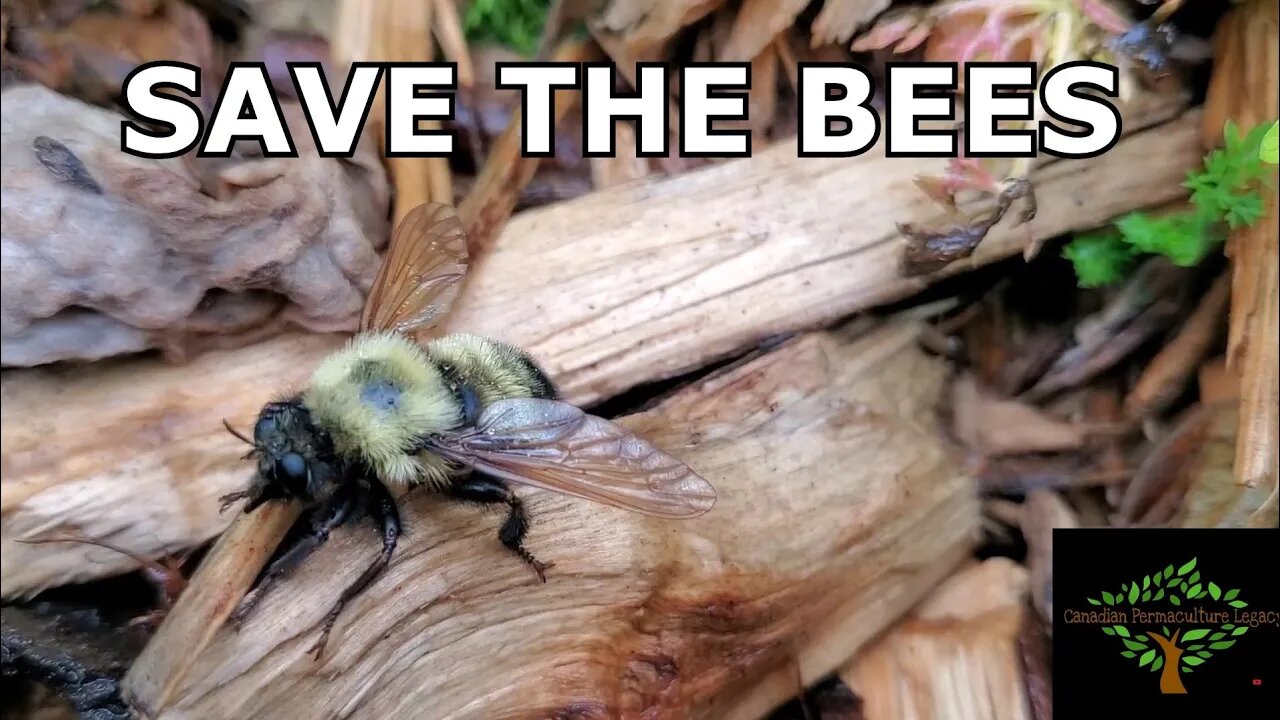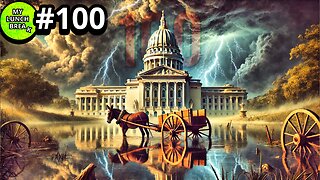Premium Only Content

Save the bees - Bob's story
Did you know that it isn't just bees that are collapsing but the entire insect biome is collapsing? What can the average person do to help?
Plant flowers/plants that are native to your area. That's really important! See what grows naturally around you.
Don't mow down dandelions in the spring. That's the first food source bees have access to.
Make a sugar water pitstop for them. Making faux nectar just like we do for hummingbirds.
Support the right farmers! and that doesn't mean organic farms, because organic farms can spray Copper Sulphate as insecticides. Support permaculture farms.
If you find a hive that needs to go, don't just destroy it! Call around and you should be able to find someone more than willing to collect it for relocation. Look for local bee keepers.
Buy local honey and wax products. Supporting bee keepers supports happy, healthy bees!
A note on native wildflower bees vs honeybees:
We need to move the conversation from trying to save honey bees specifically. They are a symptom of a much larger problem, native bee population decline.
Please understand that honey bees are not native for those of us in North America. They are actually livestock. That means keeping a bee hive is not going to save the bees.
What’s more of a concern are native pollinators they are usually solitary bees or ones like bumblebees. The big thing for them is habitat. Some are ground nesting, but others like to nest in debris like leaf litter, hollow sticks, etc. If you just have a lawn that gets mulched all the time by mowing, etc. that’s not really helping them out.
Whether it’s honey bees or native bees, food sources are the other main factor. Many bees have troubles because they don’t have a consistent food source throughout the growing season. If you have just one type of flower that blooms in July with not much else, those bees are going hungry. You want a variety of flowering plants that also bloom at different times.
There’s no silver bullet really, but that’s about as close as it gets with maintaining habitat and not just having bee food deserts, especially in cities.
Political impacts of industrial agriculture and money and power:
*Write to your local council or political representative.*
Tell them about the need to save the bees, and ask them to stop the use of pesticides in public spaces and on public owned and managed land (from parklands to community planting schemes).
Ask them to include more bee-friendly plants, and shrubs, and to make space for wildflowers along verges etc.
Ask them to reduce the mowing.
Bees love clover, and it's a great, low-growing, drought-resistant flower to include in lawned areas and along verges. Ask your council to use more clover.
Ask them to put in place a strategy for pollinators.
We can do this, and there are many ways for everyone to help out.
Credit for all the above goes to all the various entomologists on reddit for this information which I have collected over the years.
______________________
Doing shopping on Amazon? If you start your shopping by clicking on my Amazon affiliate link, it costs you nothing (not even a penny) but I receive a small commission of anything you buy. The link here takes you to my website blog on my favorite permaculture books. However, if you click on any link there as your starting point, then go buy ANYTHING, it helps support me.
Want to become a member and earn perks? Check out our membership program here: https://www.youtube.com/channel/UCfz0O9f_Ysivwz1CzEn4Wdw/join
Want CPL merch? https://CanadianPermacultureLegacy.com...
Or help me plant trees directly through Patreon by becoming a Patron: https://www.patreon.com/user?u=15912954
Want consultation services? Chat 1 on 1 and ask questions about your own project? Or do you want something bigger, like full out consultation? Want me to design your own project? I now offer those services on my website:
https://permaculturelegacy.wixsite.com/website
Moving to the country to start a new life. Young Family trades sodgrass for a horse farm over at Barn Boots and Country Roots:
https://www.youtube.com/channel/UCRevkfe3phDB0bKeJ1wW2Yw
For great recipes, cooking, storing, canning, and growing tips, check out Gardening in the North:
https://www.youtube.com/channel/UCHk8xZzWYjZv0pjfr9iOjxw
Music credits:
Epidemic sound: https://www.epidemicsound.com/referral/qfqvpi/
Closer by Jay Someday | https://soundcloud.com/jaysomeday
Music promoted by https://www.free-stock-music.com
Creative Commons Attribution 3.0 Unported License
https://creativecommons.org/licenses/by/3.0/deed.en_US
-
 26:14
26:14
Permaculture
11 months ago $0.08 earnedHeating your home - Rocket Mass Heaters, Electrical Space Heaters, Geothermal, Natural Gas, and more
4034 -
 LIVE
LIVE
Hevel Gaming
5 hours ago $0.05 earnedNCAAF Tennessee at Georgia While with Heroes of Might and Magic III & Helldivers 2
1,020 watching -
 LIVE
LIVE
MissesMaam
3 hours agoI'm Addicted | Sons of the Forest 💚✨
596 watching -
 LIVE
LIVE
a12cat34dog
6 hours agoALMOST HAVE ALL GUNS DIAMOND :: Call of Duty: Black Ops 6 :: SO MANY ZOMBIES CAMOS {18+}
452 watching -
 LIVE
LIVE
United Fight League
6 hours agoUFC 309 Watch Party w/ Rampage Jackson, Maycee Barber, Demi Bagby, and Harrison Rogers
3,034 watching -
 2:35:52
2:35:52
Jewels Jones Live ®
1 day agoELECTION OVER - LIES CONTINUE | A Political Rendezvous - Ep. 100
11.8K27 -
 3:59:18
3:59:18
GamerGril
8 hours agoPAGING ALL ZOMBOIZ | DEAD ISLAND 2
50.1K6 -
 42:24
42:24
MYLUNCHBREAK CHANNEL PAGE
16 hours agoA Century Gone
103K53 -
 38:22
38:22
Stephen Gardner
9 hours ago🔥HOLD ON! The RUMORS about Kamala are TRUE...
147K391 -
 1:22:44
1:22:44
Michael Franzese
1 day agoWill Trump’s Win Finally Convince Democrats to Stop The Woke Nonsense??
145K110